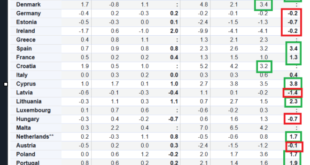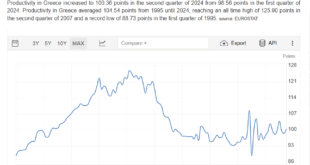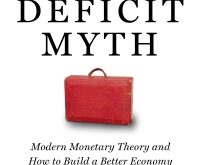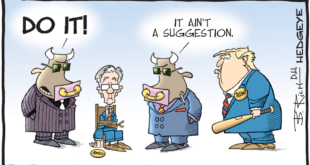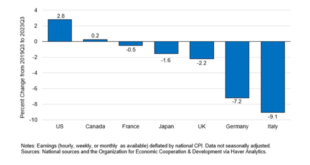Eurostat published new data on employment in Europe. Average employment growth is +0,9%. The average hides stark differences. A Germany-centered core consisting of Germany, Austria, Sweden, Estonia, Finland, and Hungary shows declines. Surprisingly, it excludes Denmark, Belgium and the Netherlands. The South does better. Countries like Portugal, France, Greece, and, especially, Spain post above-average increases. But unemployment in these countries is still high (over 5%), even when EU...
Read More »In Greece, gross fixed investment still is at a pre-industrial level.
Executive summary: if investments are needed, do not reform. Invest. Investments are the reform. Angus Maddison (historical patterns of growth) and Jan Kregel (leading post-Keynesian economist) were the intellectually dominant forces during my economics study in Groningen around 1982. Let´s apply their frameworks to Greece. Growth, as we measure it, has many sources: increasing the productivity of existing activities (the mechanization of the potato harvest), shifting labour from...
Read More »Speech in the House of Lords – Autumn Budget 2024
11th of November 2024 My Lords, there are many things to welcome in this Budget, particularly on the spending side. I am less keen on some of the tax proposals, which seem to be mean-minded and counterproductive, such as the tax on knowledge. The spending commitments are important because they reverse the disastrous policy of austerity, which has brought our public services and infrastructure close to collapse. Even the IMF, originally a champion of austerity, admitted that it had...
Read More »MMT — debunking the deficit myth
from Lars Syll We have already shown that deficit spending increases our collective savings. But what happens if Uncle Sam borrows when he runs a deficit? Is that wht eats up savings and forces interest rates higher? The answer is no. The financial crowding-out story asks us to imagine that there’s a fixed supply of savings from which anyone can attempt to borrow … MMT rejects the loanable funds story, which is rooted in the idea that borrowing is limited by access to scarce financial...
Read More »Central bank independence — a convenient illusion
from Lars Syll Today’s model of delegation has much to recommend it. But it should not be cloaked in euphemism. It is an abrogation of democratic sovereignty for pragmatic reasons, conditioned on the one hand by deeply entrenched and unflattering assumptions about electoral politics and, on the other, on an unquestioning acceptance of the private organization of credit markets and their lack of confidence in democratic control of economic policy. This may be an abrogation that we are...
Read More »How to deal with inflation?
In Europe (the Euro area, to be precise), both unemployment and inflation are down, according to Eurostat,. Which, again, shows that the Phillips curve, a crucial concept behind neoclassical macroeconomic thinking that assumes a more or less stable negative relation between unemployment and inflation (high unemployment will bring inflation down), is not the place to go when predicting or analysing inflation. Sometimes, this relation is specified as a relation between wage increases and...
Read More »Brenner’s satisfactory
from Peter Radford “Mathematics is the art of the perfect. Physics is the art of the optimal. Biology, because of evolution, is the art of the satisfactory”. That’s Sydney Brenner speaking. He should know a thing or two. He won a Nobel Prize. It’s a shame, is it not? Economies are always changing. Not just in terms of innovation and all the normal things we think of as change, but also in more simple terms: in the people making up an economy change. They are born and they die. And...
Read More »The Road Not Taken
from Lars Syll We all heterodox economists who have chosen the road ‘less traveled by’ know that this choice comes at a price. Fewer opportunities to secure ample research funding or positions at prestigious institutes or universities. Nevertheless, yours truly believes that very few of us regret our choices. One doesn’t bargain with one’s conscience. No amount of money or prestige in the world can replace the feeling of looking in the mirror and liking what one sees. My friend Axel...
Read More »Speech in the House of Lords on Watchdogs 9th of September
“”My Lords, I was not on the committee and therefore would like to allow myself a few mild criticisms of a very thought-provoking report. I will touch on three aspects of its central problem: “Who watches the watchdogs?” First, a bit of history might be helpful. In its present form, this challenge was created by the Thatcher reforms of the 1980s, which produced a new dividing line between the state and the private sector. Previously, the Government owned the public utilities and...
Read More »Milton Friedman – economic visionary or scourge of the world?
The Spectator, 13 January 2024 Monetarism, with which his name is associated, has long defined economic policy. But what would Friedman have made of the banking collapse, so soon after his death in 2006? The Keynesian economist Nicholas Kaldor called Milton Friedman one of the two most evil men of the 20th century. (Friedman was in distinguished company.) The ‘scourge’ he inflicted on the world was monetarism, a product of what Kaldor called Friedman’s Big Lie – of which more later....
Read More » Heterodox
Heterodox

